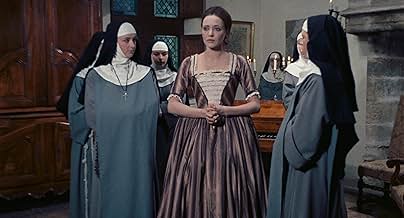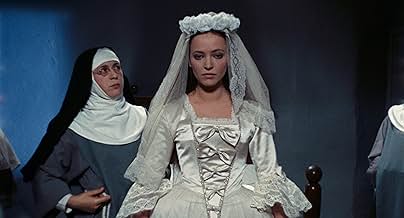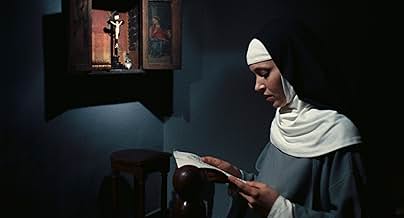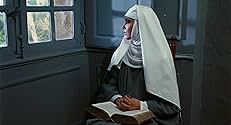Füge eine Handlung in deiner Sprache hinzuSuzanne is forced against her will to take vows as a nun and three mothers superior treat her in radically different ways. Suzanne's virtue brings disaster to everyone in this faithful adapt... Alles lesenSuzanne is forced against her will to take vows as a nun and three mothers superior treat her in radically different ways. Suzanne's virtue brings disaster to everyone in this faithful adaptation of a bitter attack on religious abuses.Suzanne is forced against her will to take vows as a nun and three mothers superior treat her in radically different ways. Suzanne's virtue brings disaster to everyone in this faithful adaptation of a bitter attack on religious abuses.
- Regie
- Drehbuch
- Hauptbesetzung
- Auszeichnungen
- 2 Nominierungen insgesamt
Empfohlene Bewertungen
As it reels from one abuse scandal to the next the last thing the Catholic Church needs right now is the timely revival of this harrowing reminder of the sheer relentless boredom and awfulness of convent life over two centuries earlier into which young women were often cast for financial rather than spiritual reasons. Especially as we now know the church was still pursuing it's abuse of the vulnerable even as it waged a furious campaign to suppress this film on it's initial appearance back in the sixties.
An incongruously sumptuous-looking production in widescreen & colour from one of the most austere directors of the Nouvelle Vague, the film is of course vastly enhanced by the melancholy beauty of Anna Karina in the title role and by the ever delightful Lilo Pulver as the sapphist Mother Superior of a rollicking and worldly convent that closely resembles Castle Anthrax in 'Monty Python and the Holy Grail'.
In this first half or so the film is about as close as one can get outside of Carl Dreyer to it being about the pain inflicted upon an innocent in a world dominated by a) a natural prejudice towards women, in this case to go completely rigidly by the rules - or, b) for that matter, a hell placed upon those who *dont* want to be nuns and just want to experience something else in the world. We see Suzanne subjected to this convent at first run by a helpful and loving Mother Superior Mme de Moni only to die and her replacement be so hard-pressed as to eventually see Suzanne as being possessed by a devil, keeping her away from the other nuns, locked up without food or water, or any legal counsel.
This part seems straightforward as does the eventual Priests-find-out-Mme-is-unrelenting-and-transfer-her story progression... but something very fascinating happens, something that makes The Nun from what is already a heart-rending and tasteful story of repression and super 18th century Christian fervor into a great film. The second convent, on first appearance, is total bliss compared to the former one. Suzanne is treated to happy nuns, a happy Mother Superior Simonin, and even some lighthearted revelry like playing games outside, something that would have never happened at the previous convent. But there's also an underlying uneasiness that is confirmed by the Mother Superior being, how should I say, "clingy" to at first Suzanne's story and then Suzanne herself.
It's not just enough for Rivette, by way of the book, to show religion being domineering and cruel and at best complacent in the expected sense, but for another look at what should be religious organization run by caring and spiritual people to be also total kooks. It's like Rivette puts down this section of some fun like the slightest of reprieves and then to bring it back under the rug, and it's something really special to see. It's a bleak story not simply because a woman who has no rightful place in a convent of nuns is forced into it and made into another cog in the religious machine, but for the lack of hope conveyed in what good there is, the goodness of people devoted to a life of faith, that is revealed. It's an incredibly precise indictment on organized religion and society that allows how it runs as much as captivating morality drama.
The Nun can also be read as a searing feminist statement, but going into this part might make this too long a review. Suffice to say The Nun, a controversial film (at the time) made from a controversial book of its time, conveys what it wants to say in stark locations and even starker performances from the supporting cast. The two actresses playing the significant Mother Superiors in the story deserve credit, yet the main reason to see the picture is for Anna Karina. She makes a sense of purpose in every scene, a performance that is startling for it being so removed from ex-husband Godard's usual self-conscious comedy/dramas and into something that requires her to plunge the depths of whatever she can handle emotionally for the character. It turns out to be the best serious performance of her's I've seen to date outside of maybe Vivre sa vie. Suzanne, thanks to Karina, is so sad a character, so right in her common sense and driven almost mad by this rigid and monstrous Christian dogma that you cant take your eyes off her for a second. It's rare to see a performance this tender and selfless to the dark and light in human being. A+
Ms. Pulver, the beloved eternal comedienne of the German cinema, has taken on that most daunting role: the lesbian Mother Superior, the ultimate debauched nun in the ultimate 'Why was the Revolution necessary?' tale, Denis Diderot's grand tale 'La Religieuse'. Working against type and expectation under the direction of Jaques Rivette, Ms. Pulver has created the most complex and compelling portrait of her long career, and she has done this in ways that deviate radically from her former screen roles.
Ms. Pulver's Mother Superior, emerges in this adaptation with her monumental weakness intact. But something new and affecting is simmering within the character, a damning glimpse of self-awareness. You get the sense that if her frantic movement stops for a second, she'll deflate into a small and bitter creature.
In films like 'Die Züricher Verlobung' and 'Das Wirtshaus I'm Spessart' Ms. Pulver's persona has always been that of a delectable waif, a vulnerable creature with a heart of gold. Here she was cast against type and rumors went that she did not get along with Mr. Rivette. And then, halfway through the film, there she was, and for the first time in her long career she didn't look remotely like an ingénue.
Ms. Pulver's portrait is so intimate and persuasive that you aren't allowed to step back and think, 'What a monster she is.' That's because, thanks to this actress's willingness to turn herself and her character inside out, you've been inside her mind. What a sad and fascinating place it is.
read my full review on my blog: cinema omnivore, thanks
Wusstest du schon
- WissenswertesDespite being approved by the Censorship Board the film's theatrical release was initial blocked by the Minister of Information.
- PatzerSuzanne plays and sings the song "Plaisir D'Amour". The final title card identifies the time and place as 'Paris, 1760', but the song was not composed until 1785.
- Zitate
Monsieur Hébert: Your superior will shortly be told in the name of Sister Marie-Suzanne Simonin of a protest against her vows with a request to leave religious life and leave the cloister to live her life as she sees fit.
- VerbindungenFeatured in Godard trifft Truffaut - Deux de la Vague (2010)
Top-Auswahl
- How long is The Nun?Powered by Alexa
Details
Box Office
- Bruttoertrag in den USA und Kanada
- 30.245 $
- Eröffnungswochenende in den USA und in Kanada
- 6.273 $
- 6. Jan. 2019
- Weltweiter Bruttoertrag
- 32.659 $
- Laufzeit2 Stunden 14 Minuten
- Sound-Mix
- Seitenverhältnis
- 1.85 : 1
Zu dieser Seite beitragen


![Bande-annonce [OV] ansehen](https://m.media-amazon.com/images/M/MV5BZjIxOTRkY2ItNjJkOS00ZWMwLWFkM2UtY2FmYzU4NTIyNWQ2XkEyXkFqcGdeQXRodW1ibmFpbC1pbml0aWFsaXplcg@@._V1_QL75_UX500_CR0)





























